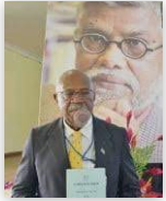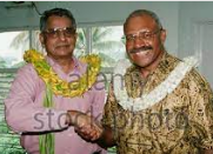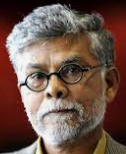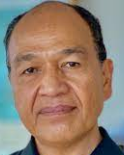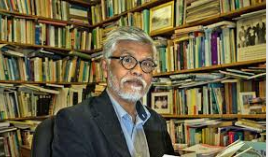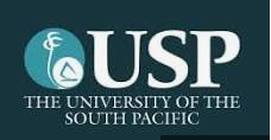CHALO JAHAJI BHAI: We mustn't allow emotionalism and ignore FACTS
Fijileaks: Suppose a member of my family dies tomorrow, and he or she is not holding dual citizenship, what law is there for me to DEMAND that
I bring my family member and bury him or her at the Vatuwaqa cemetry? We will run out of burial spaces if thousands upon thousands who fled Sitiveni Rabuka's coup and are non Fiji citizens [many voluntarily giving up their Fiji citizenship], scrawl on a piece of paper on their dying beds that their wish is to be buried or their ashes interred in their former Fiji.
What is Fiji Immigration Law on Dead Non-Fiji Citizens 'Return' to Fiji?
* The proper route should be for Dr Padma Lal to request for the lifting of her own ban now that Professor Lal has passed away, and then apply for permission to take his ashes back to Labasa for a proper interment.
* The whole sorry saga raises what right the NFP and the family of a non-citizen have to demand that their loved one be buried in the country of his or her birth?
* Our opening up the debate is no disrespect to the late Professor Brij Lal
(a friend and academic colleague for nearly four decades) or to his FAMILY.
* Suppose, for argument's sake, both Professor Lal and Dr Padma Lal, were not banned from Fiji and the FFP government still refused the ashes to be brought into the country, what legal right they have as non-citizens (presumably the whole family are Australian citizens) to demand through NFP that NO they have
the right to bring into the country Professor Lal's ashes and take it to Labasa, for he was an international scholar of repute, wrote books on Girmitiyas, and despite being a non-Fiji citizen, his wish was for his ashes to be interred in Labasa
The NFP's flagrant abuse and exploitation of Professor Brij Lal's death raise a very disturbing but pertinent question: should any Fiji government, present and future one, just allow families of the thousands of its former citizens (not holding dual citizenships) to load their deceased loved ones bodies or ashes on planes and demand that they be allowed into Fiji to be buried in their places of birth?
In Professor Brij Lal's case, he was no longer a Fiji citizen. Please, NFP, cut the political crap that he was born in Tabia, Labasa and wrote books on Girmitiyas.
The NFP should clarify through Richard Naidu the legal status of former Fiji citizens who had, and have, given up citizenship and the right to be buried in Fiji.
Even Dual Citizenship is NOT a right but a gift which can be deprived based on numerous factors, including behaviour not ‘conducive to the public good’
FROM THE SIDELINES:
* It is very clear that NFP has politicised a non-Fiji citizen, late Professor Brij Lal's death, and the question of his ashes to be brought to Fiji. Again, playing to Indo-Fijian voters by trying to raise the issue in Fiji's Parliament.
* However, the Ponga Professor Biman Prasad had very cleverly taken a back seat, and got a statement issued by the party's general secretary Seni Nabou regarding the bringing of Lal's ashes to Fiji for interment.
* We wonder when will NFP ask whether Professor Lal was assaulted, spat at, and had his glasses smashed. They have his affidavit which Fijileaks published.
* We had stood with the late Professor Lal since he was told to take the next plane to Australia in 2009. It is ridiculous for NFP to demand that since Lal wrote books on Fiji and Girmit he must be elevated to some high pedestal deserving of special recognition by the Fiji government. Lal was made an Officer of the Order of Fiji (OF) in 1998, following his role on the Constitution Review Committee.
* The proper route should have been for Dr Padma Lal to request for the lifting of her own ban now that Professor Lal has passed away, and then apply for permission to take his ashes back to Labasa.
* The NFP's flagrant abuse and exploitation of his death raises a very disturbing question: should any Fiji government, present and future one, just allow families of the thousands of its former citizens (not holding dual citizenships) to load their deceased loved ones bodies or ashes and demand that they be brought back to Fiji to be buried in their places of birth?
*In the late Professor Brij Lal's case he had renounced his Fiji citizenship and had become Australian and American citizen in 1993 and 1995 respectively. These two governments, and NOT NFP, should be raising the issue with Fiji government. * Maybe the Lal family should raise the issue with US Secretary of State who will visit Fiji - if Professor Lal was still at the time of his death an American citizen.
* Why hasn't the NFP raised a general question regarding the burial or scattering of ashes of former Fiji citizens if they die in their adopted countries without holding dual citizensips: what is Fiji government's position on the matter of such importance? Of course not, NFP wants to play election politics!
* The excerpts of an interview the late Professor Lal gave in 2000 clearly reveal his superior intellectual arrogance regarding USP in his early career.
He had found it intellectually very, very arid. He had no wish to return to Fiji.
However, he had made a very telling confession:
"Certainly if the Rabuka-Reddy coalition had won the [1999] elections,
I would have been there and given up an academic career."
RIP, Professor Brij Vilash Lal
"I arrived here [at Australian National University] in 1977 and finished my PhD in 1980, on the history of indenture, and then I went back to Fiji for a couple of years. For six months I was unemployed because there was no job for me at USP. But after that I decided I wanted to leave Fiji because I was not happy with the intellectual atmosphere there. I mean, having done a PhD at a university like ANU, which is rigorous and intellectually exciting, I felt that I was called on to play the role of a public figure, as one of the few doctorate locals at USP. I found that socially satisfying, but intellectually very, very arid. I felt that if I wanted to make a success of myself as an academic, I’d have to get away from USP. Maybe it was narrow-minded thinking on my part at that time, but I felt I needed to prove myself somewhere else. And so I went to Hawaii, and after that I came to ANU."
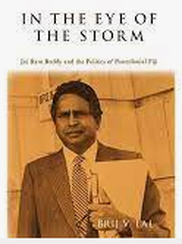
VH : What are your political plans now in relation to Fiji? Do you have intentions of going back and becoming actively involved in trying to figure out where Fiji should go or how it should resolve its problems?
BL: I had my opportunity. I have said what I think is appropriate. Emotionally Fiji will always be a part of me. That will always be there. I think that active politics is probably out now. The shadow lengthens and one is conscious of the small amount of time that’s left. I really want to do other things. Eventually, after writing a biography of Jai Ram Reddy—a story of Fiji politics from 1970 to 1999, a period when I myself came of age and was involved in some capacity with Fiji’s politic s—I’ll probably not go back to Fiji. I want to work on a multivolume history of Australian relations with the Pacific from 1800 to 2000, because I live here now. I’d like to explain this part of the world to people in this country because Australia has been a dominant power in this region. That’s one thing I want to do. Then I’d like to write some fiction. It’s difficult but I’ll try. I don’t see myself being in academia for very long. I’ve had a good run. If something better comes up I’ll certainly think about it. For the time being academic life seems to be the best alternative I have.
BL: I had my opportunity. I have said what I think is appropriate. Emotionally Fiji will always be a part of me. That will always be there. I think that active politics is probably out now. The shadow lengthens and one is conscious of the small amount of time that’s left. I really want to do other things. Eventually, after writing a biography of Jai Ram Reddy—a story of Fiji politics from 1970 to 1999, a period when I myself came of age and was involved in some capacity with Fiji’s politic s—I’ll probably not go back to Fiji. I want to work on a multivolume history of Australian relations with the Pacific from 1800 to 2000, because I live here now. I’d like to explain this part of the world to people in this country because Australia has been a dominant power in this region. That’s one thing I want to do. Then I’d like to write some fiction. It’s difficult but I’ll try. I don’t see myself being in academia for very long. I’ve had a good run. If something better comes up I’ll certainly think about it. For the time being academic life seems to be the best alternative I have.
